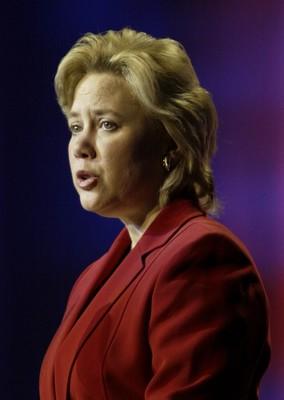Bill in works to help radio, TV stations in time of crisis
Television and radio stations in Nevada and throughout the nation could get government help when it comes to reporting on major catastrophes if a bill inspired by Hurricane Katrina fallout becomes law.
The bill by Sens. Mary Landrieu, D-La., and Ted Stevens, R-Alaska, calls for up to $10 million in matching grants annually for broadcasters to upgrade equipment and would make some television and radio station workers eligible for government-provided food, water and fuel during a catastrophe.
It would also make it harder for the government to confiscate food or fuel from broadcasting outlets during an emergency.
If the bill becomes law, it would essentially elevate broadcasters to a similar level as first responders at the scene of a catastrophe, a status that wouldn't extend to print or Internet news and information organizations.
Landrieu announced the bill during the National Association of Broadcasters annual trade show at the Las Vegas Convention Center.
The logic, according to supporters, comes from the notion that television and radio broadcasts containing reliable information during an emergency are critical to public safety.
"I would not want my family relying on a blogger or an Internet site to determine their safety," said Dick Tuininga, news director at television station KVBC in Las Vegas.
Bob Fisher, president and CEO of the Nevada Broadcasters Association, said the bill could benefit the public in the event of a man-made or natural disaster.
"The most realistic scenario is a catastrophic terrorist attack," Fisher said. "The lesson of hurricane Katrina was that power will go out, cell phones will go down, the Internet will be lost. The only thing that is going to get the information out is good, old-fashioned radio."
During the broadcasters convention, Landrieu said the aftermath of hurricane Katrina inspired the legislation.
When the storm struck only one television station in New Orleans, WWL-TV, remained on the air throughout the disaster. Landrieu attributed it to the foresight of Dallas-based Belo Corp., the media conglomerate that owns the station, with investing in upgrades before Katrina that helped outdoor equipment weather the storm.
The WWL broadcasts not only informed viewers about the storm and floods, they also distributed information police officers, firefighters and other first responders used during rescue and recovery efforts, Landrieu said.
"Without the broadcasts, they could not have done their job," she said.
But despite their role disseminating crucial information during the storm, there were instances when broadcasters had fuel confiscated and were denied access during the chaos.
Landrieu said the bill aims to avert a repeat of that scenario by clarifying the rights of broadcasters in the law that governs the federal response to emergencies.
"This is not about politics," she said. "This is about citizens lives," she told the broadcasters. "The Gulf Coast needs the broadcasters who can tell the truth about what actually happened."
The event attracts an estimated 105,000 attendees from the broadcasting and electronic communications industry.
Political contributors from the communications and electronic industry sector have also supported both Landrieu and Stevens financially. Individuals and political action committees related to that sector have donated nearly $1 million to Stevens since 1989 and more than $464,000 to Landrieu since 1996, according to campaign finance reports compiled by the Web site OpenSecrets.org. The sector includes broadcasters as well as cable, computer and telecommunications that wouldn't benefit from the bill.
Stephanie Allen, a spokeswoman for Landrieu, said the matching grant program is not a reward for major media companies who neglect their equipment.
Allen characterized it as incentive to ensure crucial information infrastructure is intact before disasters.
"It gives other companies the opportunity to stay on the air," Allen said. "(A) $10 million government program in the scheme of all the proposals coming from congress is really a small slice of money."

















